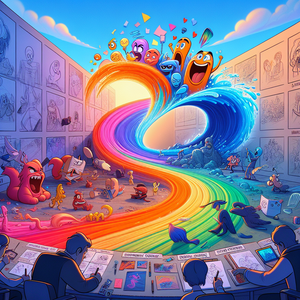The Science of Emotion in Storytelling

Emotions are central to human experience and play a pivotal role in how we remember and respond to stories. Psychological research underscores the significance of emotions in memory retention, decision-making, and social bonding. A study published in the journal *Cognition and Emotion* illustrates that emotionally charged narratives are more likely to be recalled than their neutral counterparts. This phenomenon occurs because emotional stimuli trigger specific brain responses, leading to the release of neurotransmitters that solidify the memory. Moreover, emotions serve as a vital link between the storyteller and the audience. Research by Paul Zak indicates that storytelling activates the brain's reward system, resulting in the release of oxytocin, often termed the "bonding hormone." This neurochemical response fosters a sense of connection and trust, making the audience more receptive to the narrative. When an audience feels an emotional investment in the story, they transition from passive observers to active participants, enriching their experience and engagement with the narrative.
Real-World Examples of Emotional Storytelling
Numerous literary and cinematic examples underscore the profound impact of emotional storytelling. One poignant illustration is John Green's *The Fault in Our Stars*, a novel that navigates the complexities of love and loss through the experiences of young cancer patients. The raw vulnerability and hope depicted in the characters' journeys resonated deeply with readers, transforming the story into an emotional odyssey rather than just a narrative. In cinema, Pixar's *Up* stands out for its masterful manipulation of emotion. The film’s opening montage, which chronicles the life of Carl and Ellie, encapsulates a spectrum of emotions—love, loss, and resilience. This emotional foundation captivates viewers from the outset, ensuring they are deeply invested in Carl's subsequent adventures. The power of this emotional connection amplifies the impact of the narrative, making the challenges faced by Carl all the more poignant.
Harnessing Emotion for Effective Storytelling
For writers seeking to leverage the power of emotion in their narratives, several strategies can be employed: 1. **Develop Relatable Characters**: Audiences are drawn to characters that mirror their own experiences or emotions. Writers should strive to create multi-dimensional characters whose aspirations, fears, and vulnerabilities resonate with readers. 2. **Use Vivid Imagery and Sensory Details**: Descriptive language that engages the senses evokes emotions more effectively than abstract ideas. By crafting vivid imagery, writers can immerse their readers in the emotional landscape of the story. 3. **Incorporate Personal Experiences**: Infusing storytelling with personal feelings and experiences lends authenticity and emotional depth. When writers share their vulnerabilities, they create a shared emotional experience with their audience. 4. **Build Tension and Resolution**: Emotional peaks and valleys are crucial for maintaining engagement. By introducing conflict or tension, writers can evoke a range of emotions that lead to a satisfying resolution, eliciting feelings of relief or catharsis. 5. **Evoke Universal Themes**: Themes such as love, loss, courage, and redemption transcend cultural barriers. Writers should weave these universal themes into their narratives to ensure broader resonance with diverse audiences.
The science of emotion in storytelling transcends mere theory; it is a powerful mechanism that can transform an ordinary narrative into a compelling experience. By grasping the psychological foundations of emotional engagement, writers can create stories that resonate profoundly with their audiences. Whether through relatable characters, vivid sensory details, or universal themes, the ability to evoke emotion is what ultimately makes a story compelling. As storytellers, harnessing this emotional power allows narratives to not only entertain but also inspire, connect, and leave a lasting imprint in the hearts and minds of readers. In a world increasingly reliant on connection through storytelling, understanding the emotional undercurrents can lead to more impactful and enduring narratives.
Narrative Designer
Bioware, Naughty Dog, Telltale Games
Core Responsibilities
Develop character arcs and storylines for video games or interactive media, ensuring emotional depth and player engagement.
Collaborate with game developers, artists, and sound designers to integrate narrative elements seamlessly into gameplay.
Analyze player feedback to refine narratives and enhance emotional impact.
Required Skills
Strong writing skills with an emphasis on dialogue and character development.
Experience in game design and a deep understanding of interactive storytelling.
Familiarity with game engines such as Unity or Unreal Engine.
Emotional Intelligence Coach
TalentSmart, various corporate training firms
Core Responsibilities
Facilitate workshops and training sessions to help individuals and teams improve their emotional intelligence and storytelling abilities.
Develop customized programs that enhance communication, empathy, and relationship-building skills through storytelling techniques.
Assess participants' progress and provide feedback to foster personal and professional growth.
Required Skills
Certification in emotional intelligence or coaching methodologies.
Strong interpersonal skills with the ability to engage diverse audiences.
Background in psychology or organizational behavior is a plus.
Content Strategist
HubSpot, Content Marketing Institute
Core Responsibilities
Create and implement content strategies that leverage storytelling to enhance brand identity and audience connection.
Analyze data to understand audience engagement and tailor narratives that resonate emotionally.
Collaborate with marketing teams to align storytelling efforts with campaign goals and messaging.
Required Skills
Proficiency in digital marketing tools and analytics platforms such as Google Analytics and SEMrush.
Excellent writing and editing skills with a focus on narrative-driven content.
Experience in SEO and content management systems (CMS).
Film/TV Script Supervisor
Warner Bros, Disney, independent production companies
Core Responsibilities
Ensure continuity and coherence in the script during filming, tracking emotional beats and character development.
Collaborate closely with directors and producers to maintain the integrity of the story and emotional tone.
Manage script revisions and communicate changes to the cast and crew effectively.
Required Skills
Strong organizational skills and attention to detail, particularly regarding narrative flow and emotional pacing.
Experience with scriptwriting and an understanding of cinematic storytelling techniques.
Knowledge of film production processes and terminology.
Literary Agent
Writers House, The Bent Agency
Core Responsibilities
Evaluate and represent writers’ manuscripts, focusing on stories that evoke strong emotional responses and resonate with target audiences.
Negotiate contracts with publishers while advocating for the author’s creative vision and emotional intent.
Provide feedback and strategic advice to authors on how to enhance their narratives for better marketability.
Required Skills
Strong analytical skills to assess story potential and emotional impact effectively.
Excellent communication and negotiation skills, with a deep understanding of the publishing industry.
A background in literature, creative writing, or publishing is beneficial.


